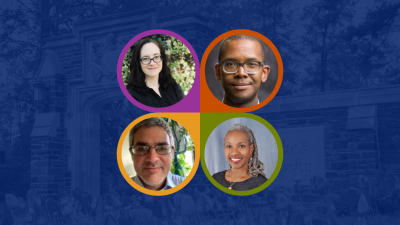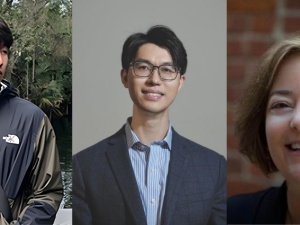Duke Welcomes New Cohort of Visiting Humanities Scholars from HBCUs and Liberal-Arts Schools

Four visiting humanities scholars from historically Black colleges and universities and liberal-arts institutions arrived at Duke this August to collaborate with Duke students, faculty and staff.
Their projects will cover commemoration practices, early Christian manuscripts, a 17th century Mexican philosopher and the ephemeral nature of digital projects.
The fellows are part of Humanities Unbounded, an Andrew W. Mellon Foundation-funded initiative designed to nurture collaboration and inventive expressions of the humanities at Duke and beyond. Now entering its fourth year, Humanities Unbounded also includes a partnership with Durham Technical Community College and a series of innovative labs, which the fellows will participate in.
The 2021–22 cohort of fellows includes:
- Vance Byrd, the Frank and Roberta Furbush Scholar in German Studies at Grinnell College and a scholar of 19th century German literature who will be working with Paul Jaskot, Jakob Norberg, and Wesley Hogan to develop models for encouraging reflection on how intersections of visual and sound studies as well as critical race theory help us think about the politics of commemoration in new ways
- Gay L. Byron, a professor of New Testament and Early Christianity at Howard University’s School of Divinity, who will collaborate with Jennifer Knust, William A. Johnson, and J. Andrew Armacost in the Manuscript Migration Lab at the Franklin Humanities Institute, applying liberation and womanist interpretations to Ethiopic manuscripts
- Sergio Gallegos Ordorica, an assistant professor of philosophy at the City University of New York’s John Jay College of Criminal Justice, who will work with Andrew Janiak and the Project Vox team on the thought of Sor Juana Inés de la Cruz (1648–1695), a Mexican woman and philosopher whose thought has been long neglected in the English-speaking world
- Kathryn Wymer, a professor of English and Digital Humanities Lab coordinator at North Carolina Central University, who will work alongside Victoria Szabo, the John Hope Franklin Humanities Institute’s Digital Humanities Initiative, Data and Visualization Sciences, Digital Scholarship & Publishing and Trinity Technology Services to understand how the swiftly changing nature of digital media influences interactions with digital humanities projects
“Our long-standing visiting faculty fellows program has been the backbone of the Mellon Foundation’s support for the humanities at Duke,” said Gennifer Weisenfeld, professor of Art, Art History and Visual Studies and one of three co-PIs on the grant, along with Vice Provost for Interdisciplinary Studies Edward Balleisen, who is also a faculty member in History, and John Hope Franklin Humanities Institute Director Ranjana Khanna of English and Literature.
“Each year an outstanding group of scholars joins and enriches the Duke intellectual community, and then take back a little bit of Duke to their respective campuses. This year’s group of visiting faculty fellows represents a broad array of excellence across the humanities disciplines. We look forward to another fantastic year of interaction and mutual learning.”
This year’s fellows follow another strong cohort who ended their visits in the spring. They included:
- Candace Bailey, a professor of musicology at North Carolina Central University who connected librarians, historians, musicologists, and scholars of women’s studies while working with Thomas Robisheaux, Liz Milewicz and Laura Williams
- Meghan G. McDowell, an assistant professor in Winston-Salem State University’s Department of History, Politics, and Social Justice who brought her focus on state violence, incarceration regimes and popular resistance to Jocelyn Olcott and Jessica Namakkal’s “ReValuing Economies of Care” lab
- Crystal Simone Smith, an assistant professor of English at St. Augustine's University who explores connections between Japanese and African American poetics, working alongside Tsisti Jaji and Adriane Lentz-Smith
“Despite a year of tremendous challenges, last year’s group of excellent scholars persisted and succeeded in advancing their research projects,” Weisenfeld said of the outgoing fellows.
“From haiku poetry on the experience of slavery, digital scholarship in musicology, and the politics of incarceration, the visiting faculty fellows produced extraordinary work and forged lifelong connections with Duke.”



